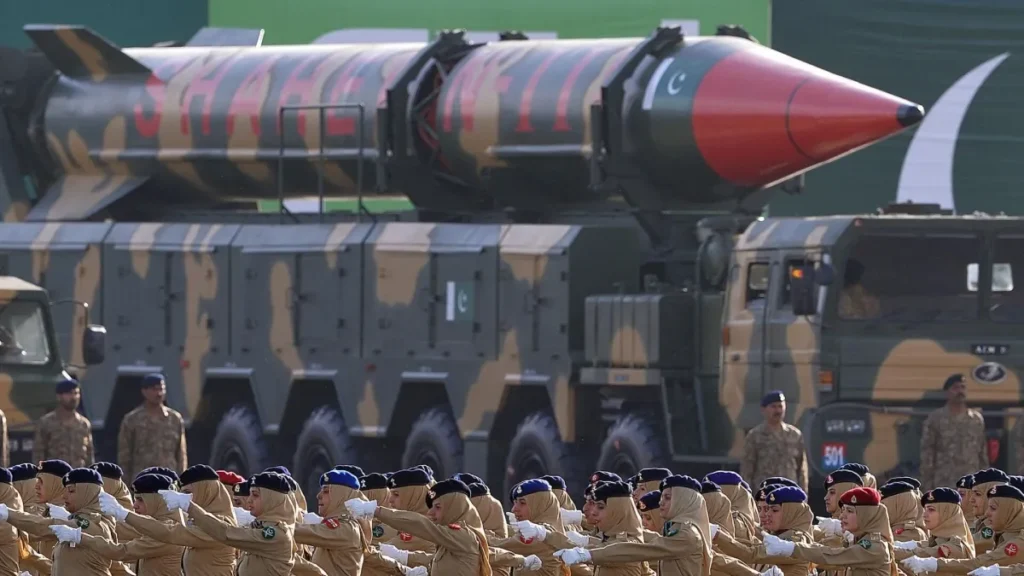In a highly volatile and unprecedented turn of events, reports have surfaced suggesting that Pakistan is developing an intercontinental ballistic missile (ICBM) with the theoretical range to target the United States. If confirmed, this move would mark a seismic shift in South Asia’s geopolitics and global nuclear diplomacy.
Though Pakistan has long maintained a so-called deterrent aimed primarily at India, while also threatening Israel with its weapons. Now the extension of its missile range towards the US could provoke severe international consequences.
“Although Pakistan claims its nuclear programme is strictly focused on deterring India, which enjoys conventional military superiority, U.S. intelligence agencies have concluded that the Pakistani military is developing an ICBM that could reach the continental United States,” the report said.
“If Pakistan acquires an ICBM, Washington will have no choice but to treat the country as a nuclear adversary. No other country with ICBMs that can target the United States is considered a friend,” the report quoted US officials as saying.
An Intercontinental Ballistic Missile (ICBM) typically has a range exceeding 5,500 kilometers (3,400 miles) and can deliver nuclear warheads across continents. As of now, Pakistan’s longest-range known missile — the Shaheen-III — is estimated to have a range of about 2,750 kilometers, sufficient to cover most of India and parts of the Middle East but far short of reaching the United States.
If Pakistan were indeed developing an ICBM, it would represent a major doctrinal departure and an ambitious leap in its missile technology, requiring massive investment, advanced propulsion systems, and global strategic recalibration.
Potential Motivations
While Pakistan has maintained a doctrine of credible minimum deterrence, an ICBM project might be viewed as an attempt to elevate its status as a global nuclear power or to deter perceived Western pressure.
This hypothetical action could signal a realignment toward adversaries of the U.S., such as China or Russia, or stem from deteriorating bilateral relations over sanctions, drone strikes, or alleged interference in domestic affairs.
An ICBM project might also be used by political or military leadership to rally nationalist sentiment or consolidate control during periods of domestic instability.
This is a dangerous development for the world as Pakistan skips its alliances on a whim. During the Afghan war it was firmly on the side of the western powers, now for the past few years it had been understood that Pakistan had been leaning towards China especially due to the belt and Road Initiative.
However now once again the Pakistan army chief has landed in the USA recommending the US President Donald Trump for the Nobel prize signaling another shift. With such deadly weapons and a volatile leadership along with the terror networks in the region, allowing Pakistan to have such weapons is a risk for every alliance.
Global Repercussions
The United States would likely respond with a combination of:
Condemnation in international forums (UN Security Council), Sanctions targeting Pakistan’s military and scientific institutions.
The US would also increase surveillance and military readiness in the Indian Ocean and Gulf region while revitalization its missile defense systems in Asia and homeland territories.
The U.S. may look to expand missile defense cooperation with regional allies (India, Israel, Saudi Arabia) and enhance THAAD, Aegis, and ground-based interceptors domestically
There is also bound to be massive regional fallout. India would likely accelerate its own missile and defense programs, possibly leading to a renewed arms race in South Asia.
China and Russia might be forced to clarify their positions, potentially mediating or exploiting the situation.
The Middle Eastern states would also become concerned over missile proliferation in neighboring regions.
The overall impact of such a move is bound to affect the global security order with alliances to be rejigged. The US which has long had a love hate relationship with Pakistan along with China will all have to reassess according to these developments. India and NATO too would be inevitably involved. The move has the potential to alter global alliances in a major way in the very near future.
